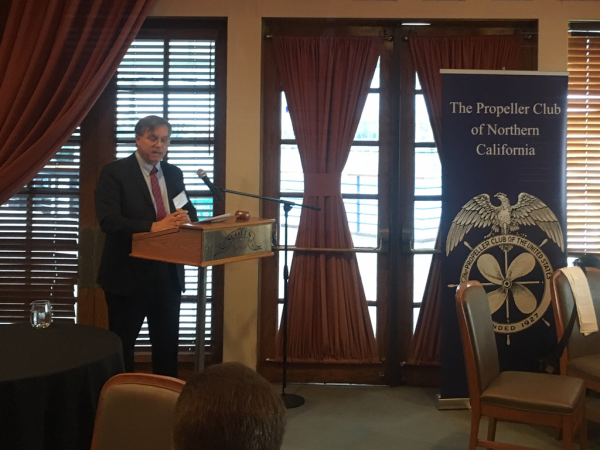The president of the Pacific Merchant Shipping Association (PMSA) warned maritime operators and customers to expect higher California air emission related taxes and fees in 2019.
John McLaurin, PMSA president, told a Propeller Club of Northern California luncheon audience to prepare for higher taxes and fees on harbor trucks, warehousing and possibly a tax on ocean containers.
New Fees to Reduced Air Emission Programs
McLaurin said that with both houses of the California Legislature in Democratic hands, chances that legislation to impose fees on ocean containers to finance reduced air emissions programs was a possibility.
He said the South Coast Air Quality Management District which regulates air quality at the Ports of Los Angeles and Long Beach as well as for warehouses servicing the two ports in Los Angeles County and to the East, is determined to impose new air emission regulations on warehouses.
McLaurin has frequently spoken out on the problem in the past warning that “the South Coast Air Quality Management District …is proceeding with plans to adopt Indirect Source Rules (ISR) for marine terminals, warehouses, and distribution centers. ISRs hold facilities operationally and legally responsible for emissions from third-party members of the logistics chain (e.g., marine terminals or warehouses will be responsible for the trucks that pick up or drop off cargo). The facility would be subjected to fines and/or limits and caps on business activity. In the case of marine terminals, an ISR could mean turning away trucks, trains, and ships (with it cargo and jobs) when government-imposed emissions levels are met.”

Oakland A’s Proposed Ballpark at Port of Oakland
McLaurin turned to the proposed Oakland A’s ballpark plan for Howard Terminal at the Port of Oakland which he said would create new parking, traffic, housing and non-maritime uses at the Port that would complicate vessel arrivals, departures as well as the ability of harbor truckers to expeditiously pick up and deliver container cargoes.
He warned that if shippers began to run into serious problems picking up and delivering containers at the Port due to congestion generated by the ballpark, the proposed hotel and condominiums “they will move their business to the Ports of Los Angeles and Long Beach.”
McLaurin’s comments about the ballpark plan met with near universal agreement from the mostly maritime luncheon audience.
Taj Tashombe, vice-president for external affairs with the Oakland A’s, attended the lunch and told the audience the ball club was sympathetic to maintaining the competitiveness of the Port of Oakland and would work constructively with maritime stakeholders to address their concerns.
For example, Tashombe said, the Oakland As have expressed support for a wider turning basin adjoining Howard Terminal in the Oakland Estuary that is essential for the Port to handle mega container ships of 18,000 twenty units or more.
The Port has announced its support of increasing the crane height for container cranes operating at the Oakland International Container Terminal (OICT) that is operated by Stevedoring Services of America (SSA).
At the luncheon, an SSA executive said that widening the Oakland Estuary turning basin is essential to SSA attracting the mega-container ships to OICT
Tashombe argued that the Oakland A’s could be a strong ally of the Port and SSA in winning permit approval and funding for the widened turning basin.

